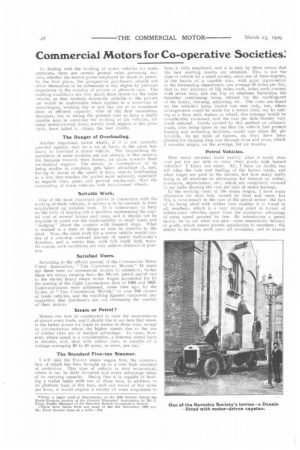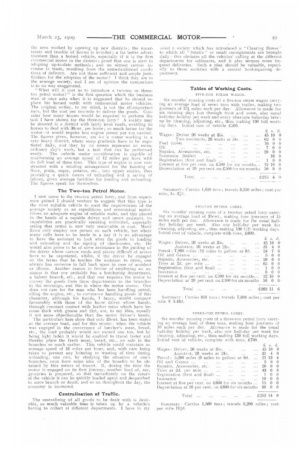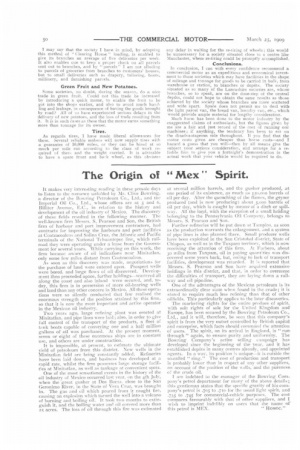Commercial Motors for Co-operative Societies:
Page 2

Page 3

Page 4

If you've noticed an error in this article please click here to report it so we can fix it.
in dealing with the working of motor vehicles for trade purposes, there are certain general rules governing success, whether the motive power employed be steam or petrol. In the first place, the prospective purchasers should not allow themselves to be influenced to any degree by previous -experience in the running of ptivate or pleasure cars. The working conditions are very much more severe for the trade vehicle, so that methods eminently suitable to the private car would be undesirable when applied to a inotorvan or motorwagon, working day in and day out at its maximum limit of efficient capacity. One of the first necessities, therefore, lies in taking the greatest care to have a really capable man to supervise the working of the vehicles, for many motor-owning firms, merely from neglect of this principle, have failed to obtain the best results.
The Danger of Overloading.
Another important factor which, if it is not carefully guarded against, may do a lot of harm, is the great tendency to overload a motor vehicle. The despatching departments of some societies are nut always, in this respect, too humane towards their horses, let alone towards their mechanical wagons. The motor, in consequence of its being unable to complain, gets taken advantage of, and, having to travel at the speed it does, resents overloading in a way that touches the pocket more seriously, especially as regards tires, gears and general mechanism, than the overloading of horse vehicles with iron-rimmed wheels.
Suitable Work.
One of the most important points in connection with the working of trade vehicles, if success is to he ensured, is their .employment on suitable work. It is unnecessary to harp on the folly of keeping idle a machine representing the capital cost of several horses and vans, and it should not be requisite to point out the inadvisability of small loads and "dodging" about the country with frequent stops. What is wanted is a state of things as near as possible to the -ideal. Now, the ideal work for a motor vehicle would consist of a non-stop outward journey of nearly half-a-day's duration, and a return trip, with full loads both ways. Of course, such conditions are very seldom obtained in practice.
Satisfied Users.
According to the official journal of the Commercial Motor Users' Association, "THE COMMERCIAL MOTOR," 12 years ago there were no commercial motors in existence; to-day there are many, ranging from the 10-cwt. petrol parcel van to the six-ton heavy steam motor wagon accounted for by the passing of the Light Locomotives Acts of 1896 and 1903. Communications were addressed, some time ago, by the Editor of " Tria COMMERCIAL MOTOR," to over 700 owners of trade vehicles, and the resulting figurest controvert any suggestion that purchasers are not increasing the number of their motors.
Steam or Petrol ?
Motors caa now be constructed to meet the requirements of almost every trade, and I should like to say here that steam is the better power for loads in excess of three tons, except in circumstances where the higher speeds due to the use of rubber tires are of marked advantage. In cases, however, where speed is a consideration, a four-ton petrol lorry • is reliable, and, shod with rubber tires, is capable of a mileage averaging 30 to 40 miles, or more, per day.
The Standard Five-ton Steamer.
I will take the five-ton steam wagon first, the construction of which has been brought up to a very high standard of perfection. This type of vehicle is very economical, where it can be fully occupied and every advantage taken of its carrying capacity. Seeing that it is capable of hauling a trailer laden with two or three tons, in addition to its platform load of five tons, and can travel at five miles per hour, it would require a society of some magnitude to keep it fully employed, and it is only by these means that the. best working results are obtained. This is not the type of vehicle for a small society, since one of these engines, iii the hands of a capable maa, with good organisation in the forwarding department, can average 25 miles per day, that is, two journeys of 12i miles each, laden each journey with seven tons, and one trip on alternate Saturdays, the Saturday intervening being utilised for the washing-out of the boiler, cleaning, adjusting, etc. The costs are based on the vehicle's being loaded one way only, but, where arrangements could be made for a return load, say by calling at a flour mill, station or wharf, this tonnage would be considerably increased, and the cost per mile thereby very much reduced. Goods carried by this method on ordinary roads, care being taken to see that the vehicle had prompt loading and unloading facilities, would cost about 3d. per ton-mile. In my table of figures, six days have been allowed for running time lost through frost and snow, which I consider ample, on the average, for six months.
Petrol Vehicles.
How many societies know exactly what it really does cost per ton per mile to carry their goods with horsed vehicles? I fancy not many. All, I have no doubt, can tell what the care and feeding of the horses totals, and what wages are paid to the drivers, but how many really bring in all expenses or allowances for interest on outlay, insurance, depreciation, etc., which are completely covered in my table showing the cost per mile of motor haulage.
In the working costs of the steam wagon, I have made allowance for days lost, caused by frost and snow, but this is unnecessary in the case of the petrol motor : the fact of its being shod with rubber tires enables it to travel in all weathers, which is a very strong point in favour of rubber-tired vehicles, apart from the enormous advantage of extra speed granted by law. By introducing a petrol motor, let its see what one gets : more expeditious delivery of goods, which means greater satisfaction to members; the ability to do extra work upon all occasions, and to extend
the area worked by opening up new districts; the uncertainty and trouble of horses is avoided ; a far better advertisement than a horsed vehicle, especially if it is the first commercial motor in the district ; proof that one is alert in adopting up-to-date methods; and an almost certain increase in trade, resulting from the extra-facilitated conditions of delivery. Are not these sufficient and ample justification for the adoption of the motor? T think they are to the average society, and I am of opinion the comparison is in no way exaggerated.
" What will it cost us to introduce a two-ton or threeton petrol motor?" is the first question which the business man at once asks when it is suggested that he should replace his horsed outfit with commercial motor vehicles. The original outlay, to my mind, is not the all-important item, but the cost per ton-mile to deliver the goods. Consider how many horses would be required to perform the task I have shown for the three-ton lorry: A society may be situated in a district with fairly level roads, enabling its horses to deal with 30cwt. per horse ; so much better for the motor—it would require less engine power per ton carried. 'f he figures given, however, are for a motor working in a very heavy district, where steep gradients have to be negotiated daily, and they by no means represent an extraordinary day's work, but a task that can be performed
easily. The chicle under consideration is eapnble of maintaining an average speed of 12 miles per hour with its full load of three tons. This type of engine is now constructed with a winding arrangement for the hoisting of flour, grain, sugar, potatos, etc., into upper stories, thus providing a quick means of unloading and a saving of labour, given average facilities for loading and unloading. The figures speak for themselves.
The Two-ton Petrol Motor.
I now come to the two-tuu petrol lorry, and front experience gained I should venture to suggest that this tyme is the most suitable vehicle to meet the requirements of the average society as an expeditious and economical motor. Given an adequate engine of reliable make, and this placed in the hands of a capable driver and smart assistant, its capabilities are practically speaking unlimited, especially seeing that petrol is now very reasonable in cost. Many firms only employ one person on each vehicle, but where many calls have to be made in a day it is an advantage to have the assistant to look after the goods in loading and unloading and the signing of check-notes, etc. He would also prove to be of some assistance in the guiding of the driver where narrow roads and places difficult of access have to be negotiated, whilst, if the driver be engaged on the terms that he teaches the assistant to drive, one always has someone to fall back upon in case of accident or illness. Another reason in favour of employing an assistant is that one probably has a butchering department, a bakery branch, etc., and that one requires the motor to convey the goods from these departments to the branches in the mornings, and this is where the motor scores. One does not care for the man who has been handling petrol, oiling the engine, etc., to commence handling good; of this character, although his hands, I fancy, would compare favourably with those of the horse driver whose hands, through constant contact with leather reins which have become thick with grease and dirt, are, to my idea, equally if not more objectionable than the motor driver's hands.
The particulars here show that only 35e.wt. has been stated as the average load, and for this reason : when the vehicle was engaged in the conveyance of butcher's meat, bread, etc., the load probably would not exceed one ton, but by being light laden it would be enabled to travel faster and thereby place the fresh meat, bread, etc., on sale in the branches so much earlier. This vehicle could maintain an average speed of 16 miles per hour, and, with care being taken to prevent any loitering or wasting of time during unloading, one can, by studying the ;situation of one's branches, soon form some idea of the benefits to be ob tained by this means of transit. If, during the time the motor is engaged on its first journey, another load of, say, groceries is prepared, -so that immediately on the return of the. vehicle it can be quickly loaded again and despatched to some branch or depot, and so on throughout the day, the economy is increased.
Centralisation of Traffic.
The centralising of all goods to be dealt with is desirable, as much valuable time is taken up by a vehicle's having to collect at different departments. I have in my mind a society which has introduced a " Clearing House" to which all " Smalls " or small consignments are brought daily : this obviates all the vehicles' calling at the different departments for oddments, and it also secures more frequeut deliveries. Such a plan should be valuable, especially to those societies with a central boot-repairing department. I may say that the society I have in miss', by adopting this method of " Clearing House" loading, is enabled to give its branches an average of five deliveries per week. It also enables one to keep a proper check on all parcels sent out to branches, and by "parcels' I am not alluding to parcels of groceries from branches to customers' houses, but to small deliveries such as drapery, tailoring, boots, millinery, and furnishing parcels.
Green Fruit and New Potatoes.
Some societies, no doubt, during the season, do a nice trade in green fruit. Could not this trade be increased by introducing a quick motor, to enable the fruit to be got into the shops earlier, and also to avoid much handling and leakage, in consequence of having the goods brought by road? All of us have experienced serious delays in the delivery of new potatoes, and the loss of trade resulting from it. It is in such cases as these that the motor earns something more than tonnage for its owner,
Tires.
As regards tires, I have made liberal allowances for these. Several reliable maters will now supply tires with a guarantee of 10,000 miles, or they can he hired at so much per mile run according to the class of work required of them and the weight carried. It is advisable to have a spare front and bads wheel, as this obviates any delay in waiting for the re-tiring of wheels ; this would be unnecessary for a society situated close to a centre like Manchester, where re-tiring could be promptly accomplished.
Conclusions.
In conclusion, I can with every confidence recommend a commercial motor as an expeditious and economical investment to those societies which may have facilities in the shape of mileage and tonnage for goods to be carried in bulk, from warehouse or station, to branches or depots. The society situated as so many of the Lancashire societies are, whose branches, so to speak, are on the door-step of the central depots, could not hope to obtain the same results as those achieved by the society whose branches are more scattered and wide apart. Space does not permit me to deal with the light parcel van, the bread van, laundry van, etc., which would provide ample material for lengthy consideration. Much harm has been done to the motor industry by the exaggerated claims of enthusiasts, but the figures given by me are a fair and just record of the cost of running our machines ; if anything, the tendency has been to err on the disadvantageous side throughout. It you find that the motor costs given are cheaper than horse costs—and I hazard a guess that you will—then by all means give the subject your serious consideration, and arrange for a reliable firm to give you a fortnight's demonstration in the actual work that your vehicle would be required to do.
























